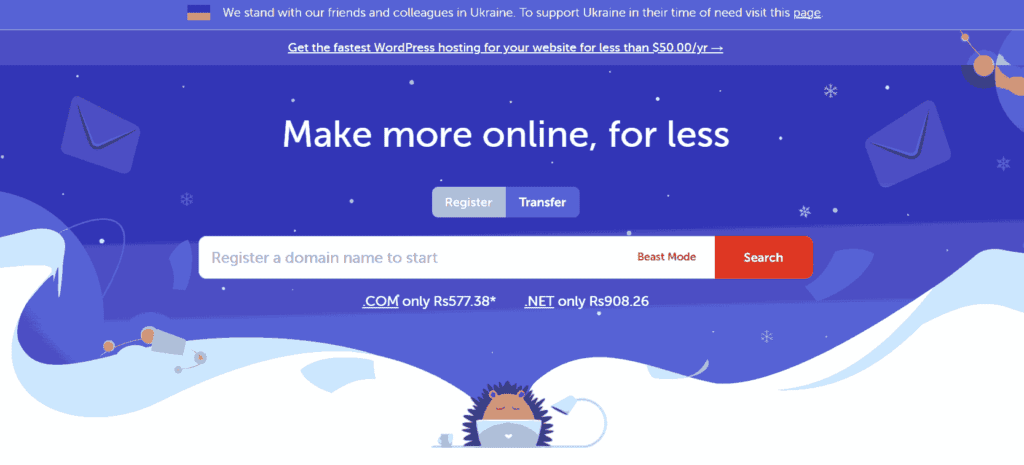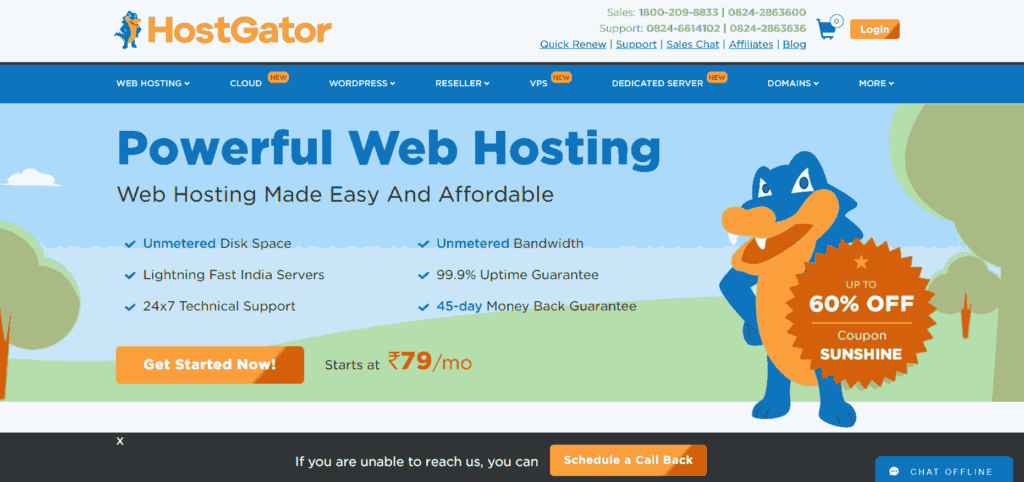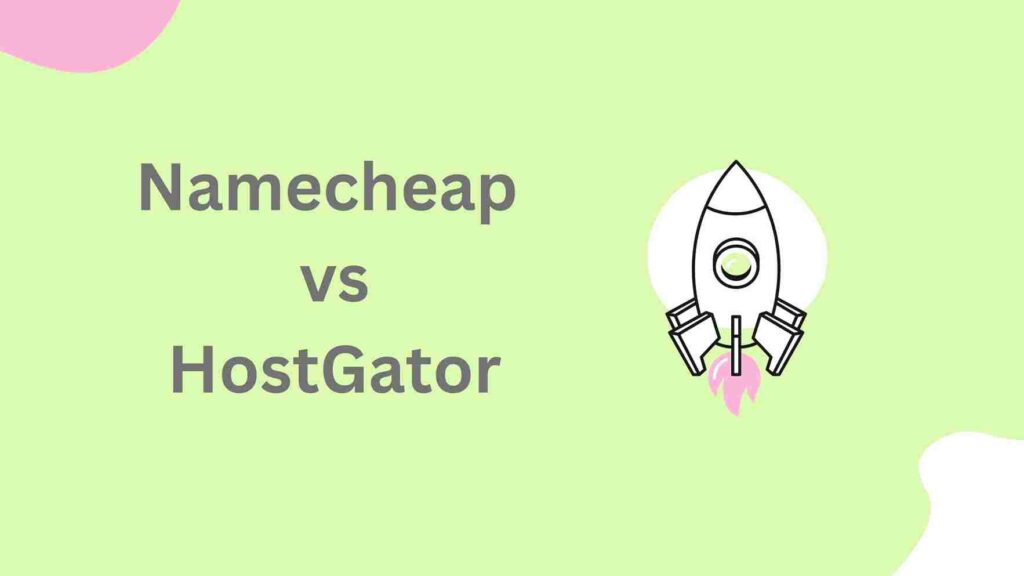Namecheap vs HostGator web hosting comparison comparing key features such as performance, pricing, pros and cons, and more – to help you decide before signing up with one of these web hosting services.
Namecheap is a domain name and web hosting company based in Phoenix, Arizona that provides comprehensive solutions to expand your company’s presence online. Unmetered bandwidth, a free website builder, protection for your domain name and privacy, free automatic SSL installation, and a 30-day money-back guarantee are just some of the included features. There are many more.
HostGator is a web hosting company based in Houston that provides low-cost web hosting services and currently powers more than 2 million websites. There is a guarantee of 99.9% uptime, a free SSL certificate, easy WordPress installs, a free domain for a year, and a money-back guarantee for the first 45 days. In addition, there are many other features.
Namecheap vs HostGator
It goes without saying that you want your web hosting service to excel at the fundamentals. However, the additional features that it offers on top of the fundamentals could be the deciding factor in whether or not it is the ideal solution for your needs. It is of even greater value when your service provider is able to find solutions to problems that are specific to your company and website. Both Namecheap and HostGator can be of assistance to you in a variety of different ways.
Highlights from Namecheap
It is essential to the success of any online business that they keep their website up and running at all times. There will not be any dependability issues, as that possibility has been eliminated. Namecheap offers a guarantee that your website will be available at all times. Namecheap provides a guarantee that states you will be eligible for a full refund if your website experiences any downtime at any point during the month.
If you already have a website, you might be hesitant to move it to Namecheap due to the possible complications that could arise from the move. Namecheap, on the other hand, will assist you in transitioning away from the hosting provider you are currently using. In addition, you won’t incur any additional expenses as a result of making the adjustment.
Namecheap offers a basic plan at an affordable price without reducing the number or quality of the services it provides. As a result, it is an appealing choice for businesses that have a limited budget for their websites because it allows them to maintain their current level of service. You can also take advantage of the 30-day money-back guarantee that Namecheap offers, which means that there is no financial risk involved in giving it a try. This guarantee is valid for as long as you keep your account active.

Highlights from HostGator
HostGator is a member of the EIG family of hosting services and is known for its affordable hosting plans and free use of the Weebly website builder, which makes it simple to construct websites.
HostGator was one of our top picks for web hosting platforms, so you know it’s a good option in general. When we take a closer look, we see that the platform provides shared hosting via a cloud-based solution, which means faster website speeds. It also provides dedicated hosting for a more powerful solution, as well as VPS hosting for a more flexible and tailored experience.
HostGator makes it simple to create a website, whether you’re starting from scratch or migrating from WordPress. Its one-click WordPress hosting instantly installs WordPress with scalable resources on your account. Furthermore, HostGator has its own website builder, so you won’t have to look for another service before you begin building your site.
You can quickly find a domain name and register it with HostGator. It even allows you to transfer your existing domain name to avoid the hassle of switching platforms. You get a free domain and SSL with each of HostGator’s plans, so you don’t have to worry about hidden costs.

Pros and cons of Namecheap vs HostGator
We dug deep into Namecheap and HostGator to show you exactly what each web hosting platform has to offer. Let’s compare their strengths and weaknesses so you can decide which one is a better fit for your company.
Pros of Namecheap:
- Price: Because there is so much competition among web hosting companies, pricing is becoming increasingly competitive, which is great news for you as a customer. Namecheap, on the other hand, has a particularly appealing pricing structure. Even the most basic package from the company includes a surprising number of features, giving it an advantage over its competitors. Furthermore, while there is a price increase after the initial period, it is not as significant as the price increase offered by its competitors. This is one area where Namecheap outperforms its competitor.
- Easy to use: Namecheap makes it easier to start a website from scratch or move it from one host to another, depending on whether or not you need to transfer it from an existing host. Transferring your website from another host to Namecheap is completely free. When you want to launch a new website, you have access to a variety of help documents and tutorials that will guide you through the stages of building your first website. Namecheap also provides a variety of different templates. You will have a professional-looking website in almost no time, and you will be able to modify it in the future as your needs change.
- Versatile hosting plans: Namecheap’s more affordable plan options are built on shared hosting. However, if you want to look into other options for hosting your website, NameCheap has you covered there as well. As a Namecheap customer, you can select from WordPress hosting, reseller hosting, VPS hosting, and dedicated hosting.
- History: It’s not always easy to sign up with a company that has a long track record of success in a market that appears to be oversaturated with website hosting providers. Namecheap is a domain registrar that has been in business for over twenty years, making it one of the companies in this industry with the longest history. It added a number of other features and services along the way. Because it has more than 11 million domain names registered under its customers’ names, you can trust Namecheap’s reliability and stability as a web hosting provider.
Areas of Namecheap need to be improved(Cons):
- Security: Despite the fact that it has some desirable security features, Namecheap falls short in a few critical areas. Namecheap provides free SSL certificates that visitors to your website can use to verify the legitimacy of your website. You will be responsible for performing these functions on your own, which may be difficult for beginners. It does not, however, monitor your server or website for malicious software or viruses.
- Customer support: If you use Namecheap and run into a simple problem, you should be able to find the solution in the service’s help documentation or through a chatbot session. Customer service responsiveness at Namecheap, on the other hand, will decrease as the difficulty of your problems increases. Namecheap does not offer telephone support to customers, in contrast to GoDaddy, which offers phone support 24 hours a day, seven days a week. Namecheap may be unable to assist you in finding a solution to a difficult problem in a timely manner.
- Simple website building tools: Namecheap does an excellent job of providing basic features to customers at an affordable price, but the company struggles to meet the needs of customers who require more advanced services. This is especially noticeable when building your site, as Namecheap only provides a simple app and pre-made templates to help you. If you need a website with more advanced capabilities than Namecheap’s standard offering, Namecheap will fall short.
Pros of HostGator:
- Variety of hosting plans: HostGator offers several plans to choose from, which may appear overwhelming at first glance. It has at least three plans in each of its shared, dedicated, and VPS hosting categories, ranging from a basic, entry-level plan for small businesses and startups to a more robust and advanced option for Enterprise businesses. With a larger selection of hosting plans, you can select one that is more tailored to your company’s needs and change it later if necessary, rather than getting a generic service that will not grow with you.
- Uptime: The most important feature to look for in a web hosting service is uptime, and HostGator guarantees 99.9% uptime. It’s not as high as other platforms, such as SiteGround, but in total, this means no more than 10 minutes of downtime per week. However, our research revealed that after 30 days of testing the platform, uptime for its shared hosting was 99.99%, making it a competitive option.
- Website building with HostGator: With HostGator’s website builder, you start by answering some questions about your business and what kind of site you want to make. Its design professionals have created everything you need, including content, images, layouts, and more. You can even get a new logo instantly with the Logomaker, and your site is already optimized for mobile, which saves you time and ranks you higher in search engines.
- Easy website setup: Before you begin, keep in mind that you will need to check your welcome email for setup prompts that will make it easier to sign up for hosting. When you arrive, the setup wizard walks you through the process, asking questions about your site and skill level before directing you to your WordPress dashboard. There are a few confusing features, such as how easy it is to forget your temporary domain, but HostGator’s setup is fairly quick as long as you remember the more detailed steps.
- Cloud based servers: Your network is hosted on several connected servers with cloud-based servers, so you have access to the most up-to-date technology. With more resource flexibility, it is easier to customise your server to your needs, allowing you to scale your hosting service with your business. While many cloud hosting services are more expensive than traditional shared hosting, HostGator makes it accessible with an introductory price of $4.95 per month.
- Unlimited sites and storage: Every plan above the Hatchling plan from HostGator includes unlimited websites and unmetered bandwidth. Each plan also includes unlimited storage.
- Pricing: HostGator’s pricing varies depending on the type of hosting you select, but its Hatchling plan is only $2.75 per month as an introductory offer for shared hosting, which is what most businesses prefer. The Baby plan costs less than a dollar more per month, at $3.50 per month, and the Business plan costs $5.25 per month. Each plan includes unmetered bandwidth, a registered domain, an SSL certificate, and one-click app integration to make setting up and using your new website as simple as possible. It also has a 45-day money-back guarantee, as opposed to Namecheap’s 30-day guarantee.
Areas of HostGator need to be improved(Cons):
- Average speed: Because HostGator is a cloud-based platform, its speeds can vary depending on your internet connection. Our tests revealed that HostGator was close to our average speeds, but other users have reported that it is close to three seconds. Because customer choice is influenced in part by website speed, you may not want to take any chances.
- Inconsistent customer response: Although HostGator offers 24-hour customer service, the experience is not always consistent. You may be connected with a knowledgeable representative right away, but some users had to wait 30 minutes. Other times, the representatives were unable to assist, which causes issues when you need to keep your business running.
- Backup retrieval fees: HostGator automatically backs up your website, but if something goes wrong and you lose it, you must pay a $25 retrieval fee for each request. Some other hosting services, do not charge a fee to restore your site.
Bottom Line
Namecheap and HostGator are both well-known web hosting companies. Plans and pricing, support, key features, security, uptime, and performance are the main differences.
HostGator has a higher rating than Namecheap. When compared to its competitor, it has a lower entry price and a 45-day money-back guarantee. It also includes Google Ads credit and other bonuses. Namecheap takes pride in providing more functional customer support than HostGator, so the two are nearly equal in quality.
Which is better here depends on your specific hosting requirements as well as the size of your website or business. However, if you prefer a more dependable provider that has been in the business for a long time over its competitor, go with HostGator.
